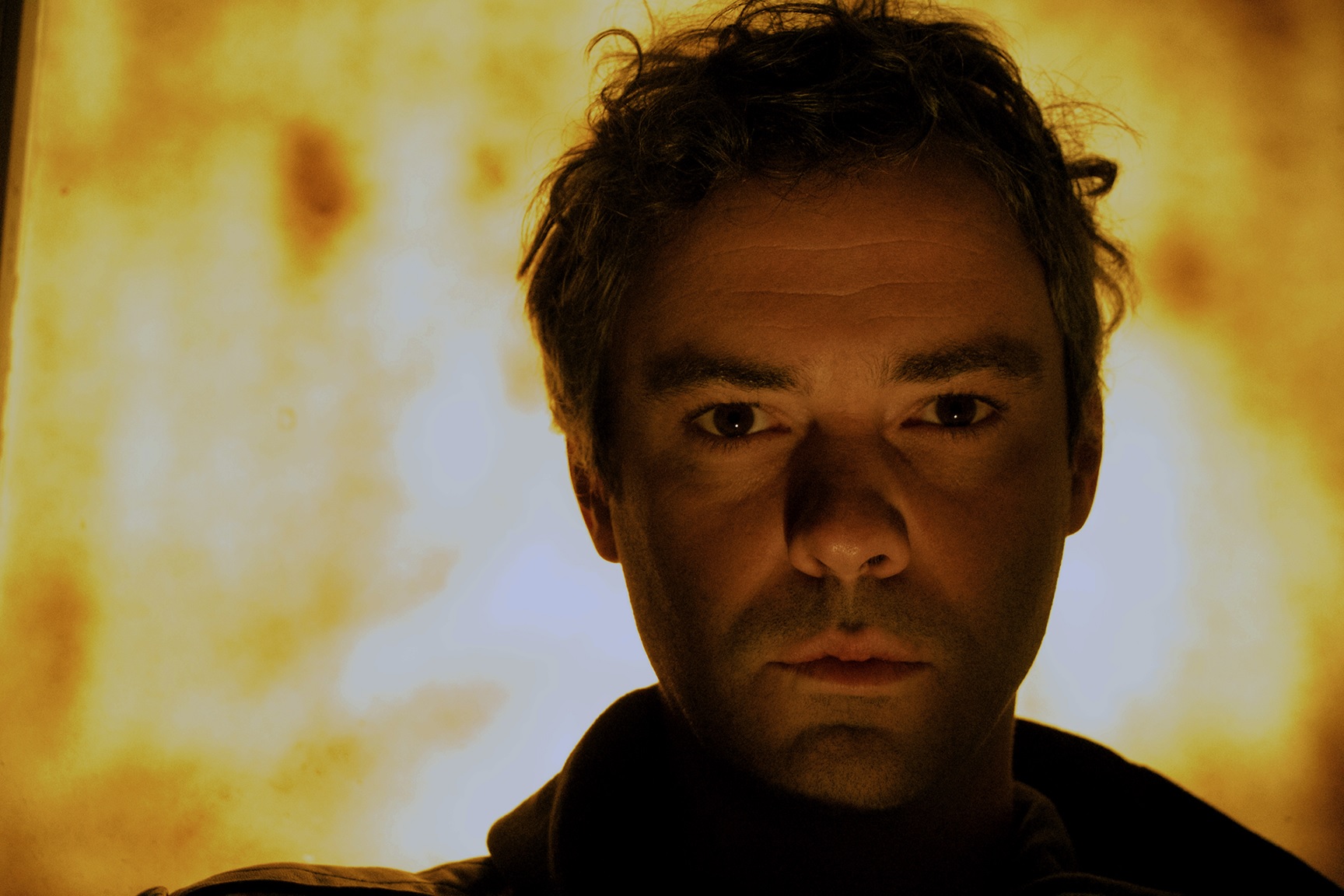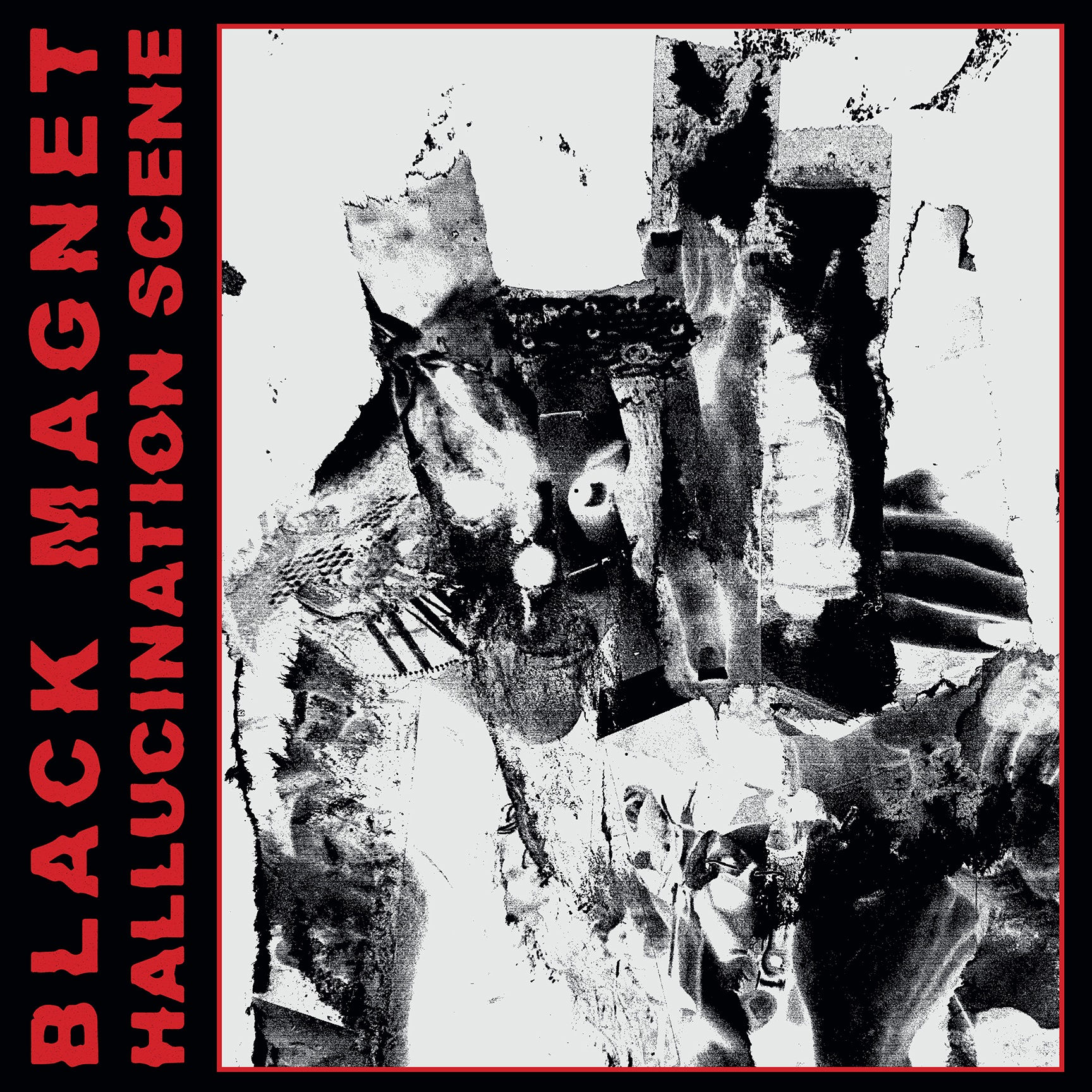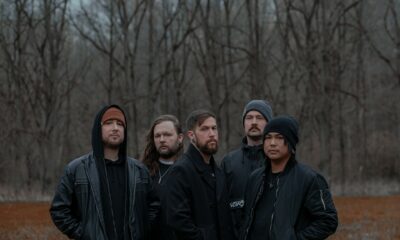Interviews
Black Magnet Wants You to Know that Industrial is Not a Dirty Word

If the mechanized and factory floor musical mimicking by the likes of Godflesh, Pitchshifter, Frontline Assembly, Ministry, Nitzer Ebb, early Nine Inch Nails, Skin Chamber, and Front 242 are the sorts of bands you like popping wooden goth-inspired moves and clinically headbanging to under black lights, then Black Magnet is something you should seriously considering slipping into your tote bag. Back in September, the Oklahoma City-via-Los Angeles one-man project of burgeoning multi-instrumentalist James Hammontree dropped its debut album, Hallucination Scene into the welcoming arms of those who don’t mind a little cybernetics with their distortion, rhythmic throb, electronic harshness and dystopian themes.
Despite being firmly rooted in an identifiable subgenre, Hallucination Scene is a special beast unafraid to dive headfirst into certain genres while reverently cherry-picking, twisting, and mixing from and with others. With all the live plans the band had in support of the new album kyboshed for obvious reasons, Hammontree took a big ol’ block of time to sit down and answer a few questions using the power of the interhole to tell us about the never-ending fluidity of his creative process, how musical isolation can breed musical discovery, and that it’s ok to admit being a fan of Rob Zombie.
Seeing as Black Magnet is a fairly new project, can you give a brief history?
James Hammontree: “The project began in early 2018 with a demo song called ‘Dreams Beyond Control.’ I had been learning how to program electronic drums, messing around with synthesizers and learning how to effectively demo songs on my own. I wrote a couple of ideas, more on the catchy side of darker ‘80s new wave. I liked the songs, but they felt like they were missing something. I added heavy down-tuned distorted guitar over them and, boom, light bulb moment! All of a sudden everything made sense. I immediately wrote the first four-song demo tape in about a month and recorded it at a friend’s studio soon after. I played a few shows locally with decent response, assembled a live band and booked a three-week tour within that same year.”
Does working in a solo capacity have roots in being dissatisfied or creatively unfulfilled with previous band experiences? Is working on Black Magnet on your own tied into a personality trait, necessity or experimenting with a different way of doing things for yourself?
“Working solo on this project came more out of necessity than anything else. I didn’t know anyone remotely interested in making a band of this style, let alone anyone interested in playing heavy guitars with a drum machine. Even though I didn’t know it at the time, I definitely was personally and creatively stunted after being in bands my whole life. Once I started working on Black Magnet it opened up a whole new creative and intuitive side of myself I didn’t know existed. Out of that opened up new ways of working I would have never explored previously, a lot of experimenting and trusting myself. I love collaboration, but working within the restrictions of myself helped this project really come into its own.”
When putting Black Magnet together, was the industrial metal sound a particular sonic goal/direction you had in mind? Were you looking to deliberately do something that stood apart from past projects or did it just happen naturally?
“I’ve always loved the sonic palette of industrial metal even if the majority of songs and bands weren’t top tier in the broader scope of music. Heavy guitars with electronic drums just have a crushing yet synthetic feel to me that I have always connected to, not to mention how absolutely versatile and heavy a synthesizer can be. I feel that the synth is an often overlooked instrument in the world of heavy and aggressive music, but there is so much you can do with them dimensionally that you can’t do with guitars and drums.
When I started writing for Black Magnet I tried to achieve something that I wanted to hear for myself with no holds barred. I wasn’t afraid of being ‘cheesy’ or how ‘using a drum machine sounds fake’ or people saying it sounded like Rob Zombie, or whatever. I was honing in on things that I liked and trusting myself creatively. I knew if I did that I would come out with something genuine and honest. I also felt like there was such a big gap in so much of my favourite darker music that I thought, ‘why not do it all? Why not do everything I like about it all in one band?’ That could be what helps set it apart from the past. I also like Rob Zombie, by the way.”

Artwork for ‘Hallucination Scene’ by Black Magnet
What’s the story and significance of the name Black Magnet?
“I wanted Black Magnet to have a strong visual intention. Not even so much as a logo or artwork, though that is extremely important to me, but I wanted the music to have an imaginative feeling, something that you could visualize images with while listening. Something cold, sterile, and machine-like as well as something that draws you in without control. A magnet made sense to me and became stuck in my mind. I felt like it was something I could consistently draw inspiration from, visually and musically. I also don’t think names should be over complicated, you can typically say more with less in that respect.”
How long did it take to write Hallucination Scene, how far back does the material on the album go and what drove the new album?
“Hallucination Scene took about a year to write. It was recorded about a year and a half after the project’s conception and I began working on the songs soon after I recorded the first demo tape. At the time, I was playing guitar in another band in LA (All Your Sisters) and Black Magnet was just becoming my main creative focus. I was doing a lot of traveling and touring at the time, so the writing was a bit spread out. I think this worked to my advantage as I had more time to reflect on it and had no immediate deadlines. Personally, I was going through a lot of changes and working through a lot of personal emotional turmoil. Inside I was feeling the worst I had ever felt in my life and music was literally my only avenue to escape that feeling. It was all I had and all I had ever worked for.
The album is a pretty big clash of emotions and representative of how I felt at the time. I had no funding, no band, I had lost some important people in my life and felt completely isolated. I knew there was a way out and I knew I had to do the album at any cost. I knew that if I focused my intention and my feelings the desired outcome would arrive, that remained my motivation for the album.”
What are the advantages and disadvantages to working on a full-length by yourself? Are deadlines and endless tinkering something you have to keep cognizant of otherwise things will never get finalized?
“Aside from the demo, it was also the first time I had written, played, sang and recorded every instrument on my own on a full-length album, so there was a lot of learning with that too. The main advantage of working on a full-length by yourself is that you can work in full confidence of knowing exactly what you want without anyone getting in the way. That also can lend itself to a disadvantage because there is only one person keeping check over quality control. There have been times that someone has made a suggestion that seemed so obvious that I would have never thought of it, but at the same time there would have been so many vital things that another band member may not have potentially let me get away with. For me, it was important to check myself constantly and stay as practiced as possible while also keeping the songs fresh and inspired at the same time. This can make you insane, but if you focus your intention you can allow yourself to make the right moves.
Though it has always come down to me, I also had a few close friends I could show demos to and get an honest opinion. Constant experimentation was also extremely important. Try screaming it ten feet away, hit it with a hammer, reverse the signal, slow it down, write a chorus in 30 seconds, put mud on your face, etc… With the technological capabilities of music and sound you eventually just have to cut it off and know when a song is done, much like painting. There is no real recipe to what makes a song great, if there was everyone would write one, but you immediately know when you hear something you like.”
What would you say were some of the lessons learned during the process of writing and recording the EP that were applied to the album? Was there anything that was done different in the creation of the album, deliberate or otherwise?
“Learning every part on every instrument through and through was the biggest lesson learned on the EP. That was integral to saving time in the studio and getting exactly what I wanted out of the songs. Having all the songs ready and as far as you can take them allowed me the ability to focus while recording. The album was tracked in four days so there was no time to waste. Doing a solo album is definitely the ultimate test in being prepared. On the EP, I was just getting my feet wet with what I wanted to do sonically, but the album has much more of a creative direction and intention. They were basically created the same way technically, but with a much bigger and broader knowledge of sound, effects, synths and songwriting on the album.”
What was the recording process like? Did you do most of it yourself/at home or did you actually pack up some gear and go into a studio with (producer) Sanford (Parker)?
“Because of the electronic nature of the project I am pretty much recording as I am writing each song. They grow and evolve so much over time that each song has between ten to fifteen versions. Once I feel like I have arrived at something I like, I demo the songs and take it as far as I can on my own until I have a rough idea of what the album will sound like. I bounce each stem of each song onto individual tracks (usually 40 to 60 tracks per song) and bring them to the studio with me on a hard drive (never underestimate file management). Once Sanford imports the stems for each song, I re-record guitar, bass, and vocals with my guitars and his studio setup and we dig deeper into the songs to see what they need. Once we get a performance we like on a particular song, we dive into different sounds, effects and methods that can beef up the song and bring it more to life.
As I should’ve mentioned in my previous answer, Sanford is a HUGE help technically and creatively. I cannot emphasize that enough. He has an amazing modular synth setup and top of the line vintage and modern guitar equipment (plus) his mixing and knowledge of sound is incredible.”
What is the significance or story behind the album’s title and what is going on on the cover?
“Like I had mentioned previously, I wanted the band to have a visual aspect within the music. I wanted to create sounds that you could close your eyes and visualize with. We all have felt that certain consciousness while listening to music and have assigned visual representations with it. I wanted to usher that idea along with the songs and thought that Hallucination Scene was an appropriate title. The album cover was done by an awesome visual artist named James Ventura and it is a cut up and inverted collage of a skull with different body parts and textures taped around it.”
How and when did you hook up with 20 Buck Spin?
“After I recorded Hallucination Scene I sent the completed album out to a few different labels I was interested in potentially working with. After a few months went by, Dave at 20 Buck Spin e-mailed me and was interested in putting out the album. I signed with them in the early spring of 2019, we worked out the details and began setting out on its release. 20 Buck Spin has been amazing to work with and shown endless support. I have always respected the label for setting the bar high for contemporary heavy music and I feel privileged to be a part of the roster.”
What do you feel Black Magnet offers listeners that is different from other bands of this ilk? Similarly, what does Black Magnet provide for you creatively that other bands/project you’ve been a member of hasn’t?
“I feel that Black Magnet isn’t locked down into one sound or identity, though I have chosen a sonic palette typically used in industrial metal. Electronic music can be so incredibly versatile that, even when mixed with heavy guitars, the possibilities for sounds and songwriting are endless. My hope is that it can expose people to the idea of exploring new sounds and concepts that can exist outside of the typical parameters that most bands exist in. This is something Black Magnet has also provided for me personally within creating it. The project has also been the most fulfilling creative endeavors of my life and provided a deep sense of introspection and reflection that I feel nothing else could’ve done. That isn’t to say it’s always been fun and easy. The writing and preparation can take a lot of mental and emotional labour, but the payoff is only worth as much as you put into it.”
The popularity of music genres moves in cycles. Black Magnet is obviously very indebted to a certain branch and era of extreme music. In your experience and communiqués with others, have you seen any much more evidence of there being a broad resurgence of the industrial sound?
“I definitely think so! I think people involved in heavy and dark music aren’t as afraid of synthetic instruments as they have been traditionally in the past. At the point we are at with music, so many bands with this sonic palette are considered classic. Not to mention that most music we grew up with on the radio was all written and coming out of a computer, at one point or another. I also think that people are discovering the creative capabilities electronic instruments provide within heavy music. I do find that many of the current ‘industrial’ or ‘industrial metal’ bands do stick to the basic traditional recipe that the classics created, it can be disappointing but it is that way in any genre. Songwriting, creativity and intention still remain the most important.”
Obviously, live music and touring has ground to a halt because of the Trump Virus. But do you have a support plan in the works for the album when you’re able to get out there? Was the album’s creation or release impacted by COVID-19 in anyway?
“Absolutely. Because of COVID the album release was pushed back about three months and the two tours I had booked in its support were cancelled. The tours will DEFINITELY be re-booked once everything clears up. I am planning on a full U.S. tour, Europe and a few festivals including Migration Fest, the fest 20 Buck Spin puts on. Ethan McCarthy from Primitive Man/Heavy Talent Booking is my booking agent now and we will definitely have some solid touring coming up in the future. I also have a new full live band I couldn’t be more excited about.”
Given that most people have had way more time on their hands throughout 2020, did you take more time during the creative process of the new album than you normally would have? Were you able to take a step back and really analyze your own music? What did you discover about your own music that you hadn’t noticed or considered before?
“It should be noted that Hallucination Scene was recorded in June of 2019, so we didn’t have to worry about COVID. But since the pandemic, I have written and recorded another album. There has definitely been much more time to reflect and analyze what Black Magnet has been in the past and what I want it to be in the future. I have put together a new live band of incredible musicians and we have started writing and recording some new songs as well. I think even more creative expansion has occurred in new ways, as well as learning how to make myself available to working and writing consistently. Everything is always changing and COVID has shown that more than ever. It seems like the perfect time to adapt, reflect, and relearn yourself and creativity. Working on this project has also been extremely important to remain sane in the current times.”
With the touring world on lockdown throughout the year, what have you been occupying your time with and what do you feel you have learned about yourself, both as a musician and a human being?
“I have gotten much better at audio engineering and working with on-board effects and plug-ins. Expanding my knowledge in that realm has been really overwhelming but really fun and a great way to spark new ideas and spend my time. Aside from music, I have definitely been reading much more than I have in years. I bought a kayak and have been doing a lot of fishing, hiking and camping. Learning new outdoor skills and focusing on myself internally. I think the most important thing I have learned about myself during the pandemic is not to take for granted the things that seem so obvious day to day. Friends, family, live music, record stores, touring, parties, favorite restaurants, etc… life is so short and when those things come back I will be more grateful than ever.”
-

 Music6 days ago
Music6 days agoTake That (w/ Olly Murs) Kick Off Four-Night Leeds Stint with Hit-Laden Spectacular [Photos]
-

 Alternative/Rock12 hours ago
Alternative/Rock12 hours agoThe V13 Fix #011 w/ Microwave, Full Of Hell, Cold Years and more
-

 Alternative/Rock1 week ago
Alternative/Rock1 week agoThe V13 Fix #010 w/ High on Fire, NOFX, My Dying Bride and more
-

 Features6 days ago
Features6 days agoTour Diary: Gen & The Degenerates Party Their Way Across America
-

 Culture1 week ago
Culture1 week agoDan Carter & George Miller Chat Foodinati Live, Heavy Metal Charities and Pre-Gig Meals
-

 Music1 week ago
Music1 week agoReclusive Producer Stumbleine Premieres Beat-Driven New Single “Cinderhaze”
-

 Indie12 hours ago
Indie12 hours agoDeadset Premiere Music Video for Addiction-Inspired “Heavy Eyes” Single
-

 Alternative/Rock1 week ago
Alternative/Rock1 week agoThree Lefts and a Right Premiere Their Guitar-Driven Single “Lovulator”














